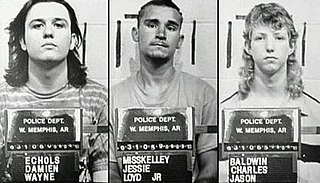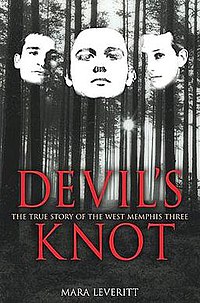
The West Memphis Three are three freed men convicted as teenagers in 1994 of the 1993 murders of three boys in West Memphis, Arkansas, United States. Damien Echols was sentenced to death, Jessie Misskelley Jr. to life imprisonment plus two 20-year sentences, and Jason Baldwin to life imprisonment. During the trial, the prosecution asserted that the juveniles killed the children as part of a Satanic ritual.

Paradise Lost 2: Revelations is a 2000 American documentary film directed and produced by Joe Berlinger and Bruce Sinofsky, and the sequel to their 1996 film Paradise Lost: The Child Murders at Robin Hood Hills, about the trials of the West Memphis Three, three teenage boys accused of the May 1993 murders and sexual mutilation of three prepubescent boys as a part of an alleged satanic ritual in West Memphis, Arkansas.

Paradise Lost: The Child Murders at Robin Hood Hills is a 1996 American documentary film directed, produced and edited by Joe Berlinger and Bruce Sinofsky about the trials of the West Memphis Three, three teenage youths accused of the May 1993 murders and sexual mutilation of three prepubescent boys as a part of an alleged satanic ritual in West Memphis, Arkansas.

Free the West Memphis 3 is a compilation album released in October 2000 by Koch Records as a benefit for the legal defense of the West Memphis Three, three men who, while teenagers in 1994, were tried and falsely convicted of the 1993 murders of three boys in West Memphis, Arkansas. The album was organized by guitarist Danny Bland, Eddie Spaghetti of the Supersuckers, and Scott Parker, who served as executive producers of the project.

Joseph Berlinger is an American documentary filmmaker and producer. Particularly focused on true crime documentaries, Berlinger's films and docu-series draw attention to social justice issues in the US and abroad in such films as Brother's Keeper, Paradise Lost: The Child Murders at Robin Hood Hills, Crude, Whitey: United States of America v. James J. Bulger and Intent To Destroy: Death, Denial and Depiction.
A false confession is an admission of guilt for a crime which the individual did not commit. Although such confessions seem counterintuitive, they can be made voluntarily, perhaps to protect a third party, or induced through coercive interrogation techniques. When some degree of coercion is involved, studies have found that subjects with highly sophisticated intelligence or manipulated by their so-called "friends" are more likely to make such confessions. Young people are particularly vulnerable to confessing, especially when stressed, tired, or traumatized, and have a significantly higher rate of false confessions than adults. Hundreds of innocent people have been convicted, imprisoned, and sometimes sentenced to death after confessing to crimes they did not commit—but years later, have been exonerated. It was not until several shocking false confession cases were publicized in the late 1980s, combined with the introduction of DNA evidence, that the extent of wrongful convictions began to emerge—and how often false confessions played a role in these.

The Varner Unit is a high-security state prison for men of the Arkansas Department of Correction in Varner, Choctaw Township, unincorporated Lincoln County, Arkansas, United States. It is located along U.S. Highway 65, near Grady, and 28 miles (45 km) south of Pine Bluff. The prison can house over 1,600 prisoners, and it includes a 468-bed supermax facility. The supermax and non-supermax facilities are separate from one another.
Richard Jason Ofshe is an American sociologist and professor emeritus of sociology at the University of California, Berkeley. He is known for his expert testimony relating to coercion in small groups, confessions, and interrogations.
Stephen L. Braga is an American lawyer, best known for his pro bono representation of Martin Tankleff and the West Memphis Three. He also represented Michael Scanlon, the number two target in the Jack Abramoff Indian lobbying scandal. Braga is currently the Director of the Appellate Litigation Clinic at the University of Virginia School of Law. In addition, he chairs the national white collar practice at Bracewell LLP.
Joe Berlinger and Bruce Sinofsky were a team of American documentary filmmakers that have won cult fame and critical acclaim. The duo are probably best known for their trilogy of Paradise Lost films about the so-called West Memphis Three, and for their 2004 Metallica documentary Metallica: Some Kind of Monster. Though they often worked together, Berlinger and Sinofsky also separately directed their own projects.
David Burnett is an American Democratic politician and former member of the Arkansas Senate. Before he entered the Senate, Burnett had been a judge. Burnett is known as the trial judge of the controversial West Memphis Three trial during which he made several serious mistakes.

Paradise Lost 3: Purgatory is a 2011 American documentary film directed by Joe Berlinger and Bruce Sinofsky, and sequel to their films Paradise Lost: The Child Murders at Robin Hood Hills (1996) and Paradise Lost 2: Revelations (2000). The three films are about West Memphis Three, three teenage boys accused of the May 1993 murders and sexual mutilation of three prepubescent boys as a part of an alleged satanic ritual in West Memphis, Arkansas. Purgatory offers an update on the case of the West Memphis Three, who were all recognized guilty of the murders in 1994 but kept on claiming their innocence since then, before culminating with the trio's attempt at an Alford plea.

West of Memphis is a 2012 New Zealand-American documentary film about the West Memphis Three that was directed and co-written by Amy Berg, and produced by Berg, Fran Walsh and Peter Jackson, and Damien Echols and his wife, Lorri Davis. It was released in the US by Sony Pictures Classics to critical acclaim, and received a nomination for Best Documentary Screenplay from the Writers Guild of America.

Devil's Knot is a 2013 American biographical crime drama film directed by Atom Egoyan and adapted from Mara Leveritt's 2002 book of the same name. The film is about the true story of three murdered children and three teenagers, known as the West Memphis Three, who were convicted of killing the three children during the Satanic panic. The teenagers were subsequently sentenced to death (Echols) and life imprisonment, before all were released after eighteen years.
Brian Keith Baldwin was an African-American man from Charlotte, North Carolina, United States of America, who was executed in 1999 in Alabama. Many believe that he was wrongfully convicted and sentenced for the 1977 murder of a young white woman in Monroe County of that state. The only evidence against Baldwin in the murder was his own confession, which he later retracted. He said that it was coerced by the local police in Wilcox County, Alabama, where he was arrested; they beat and tortured him under interrogation. A 1985 letter by his co-defendant Edward Dean Horsley surfaced in 1996, after Horsley had been executed for first-degree murder in the case. He wrote that he had acted alone in the rape and murder of Naomi Rolon, and that Baldwin had not known of her death.
Anthony Lamar Smith was a 24-year-old African American man from St. Louis, Missouri, who was shot and killed by then St. Louis Police officer Jason Stockley following a car chase on December 20, 2011. On September 15, 2017, Stockley was found not guilty of first-degree murder, and protests erupted in St. Louis.

Damien Wayne Echols is an American author who first became known as one of three teenagers, the West Memphis Three, convicted of a triple murder in 1994 despite the lack of physical evidence connecting them to the crime and the dubious nature of the other evidence. Upon his release from death row in 2011 under an Alford plea, Echols authored several autobiographical and spiritual books. He has been featured in multiple books, documentaries, and podcasts about his spiritual works and the West Memphis Three case.
Mara Leveritt is an American investigative reporter focused on Arkansas. In 1991, she broke the story that plasma drawn from Arkansas prisoners was being sold on the international market with inadequate screening for diseases. The program ended in 1994 and the prison director was forced to resign. By then, more than 1000 Canadians were infected with HIV from plasma traced to Arkansas prisons and another 20,000 were infected with hepatitis C.










